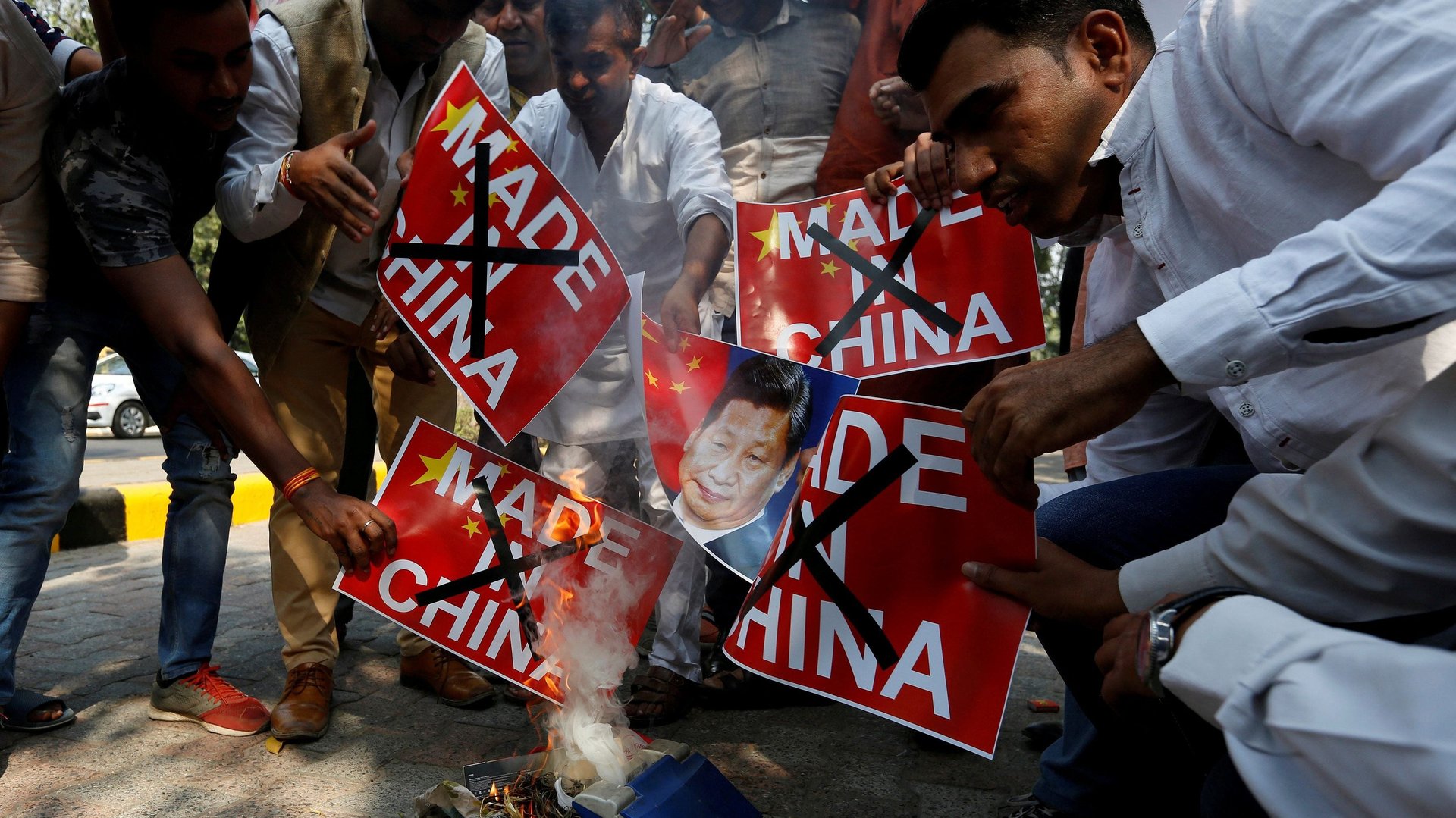Why millions of Indian traders are setting Chinese goods on fire
The prevailing bilateral frost between India and China is having a chilling effect on local trade as the south Asian nation prepares to celebrate its annual festival of colours.


The prevailing bilateral frost between India and China is having a chilling effect on local trade as the south Asian nation prepares to celebrate its annual festival of colours.
Around 60 million members of the Confederation of All India Traders (CAIT) have called for the boycott of Chinese goods on the eve of Holi, one of India’s most popular festivals. Some business owners even plan to use such products to make the traditional bonfire—Holi symbolises the burning of an evil demon in Hindu mythology—today (March 19) across 1,500 locations in the country.
“We will rope in other organisations also such as transport, small industries, and hawkers to make the campaign successful,” said Praveen Kumar, president of the Federation of Sadar Bazar Traders Association (SBTA), a CAIT-affiliated body of traders in one of Delhi’s largest wholesale markets for household items. SBTA will light one such bonfire today.
Their trade-related grievances have assumed a nationalistic hue following the security and diplomatic developments over the past few weeks.
Last week, China vetoed the UN Security Council’s move to brand Pakistan-based jihadist Masood Azhar a global terrorist. Azhar’s organisation, the Jaish-e-Mohammed, had claimed responsibility for the suicide attack on an Indian security convoy in Jammu & Kashmir that led to the death of over 40 personnel in February.
“We have been urging the government to reduce dependence on Chinese goods for long. Now is the time to completely boycott Chinese products because now it is the question of our nation,” said Noida-based businessman Sudhir Sharma.
Anti-China sentiment
In a March 15 press release, CAIT shared a long list of complaints against Chinese goods. Some of these include:
Unfair trade: Chinese goods often come at bottom-of-the-barrel prices because of unfair tactics. Some of these products are declared at undervalued prices. “When such material which are grossly undervalued come to the port, custom duty is paid at a very low price. Also IGST (international goods and services tax) is paid at a lower price and then this material goes into grey market and is sold at competitive prices as compared to Indian goods where GST is paid at full amount,” CAIT said.
Hawala: The government must “closely scrutinise imports where more of Hawala transactions are involved,” the trade body said. Hawala refers to informal modes of money transfer used by Chinese vendors, which fuels the underground economy.
Safety: “Chemicals…are being used for colouring different things (and) the food items which they are sending,” CAIT says about Chinese good. Experts tend to agree on this one: Every product from China—especially those applicable on the skin or consumables—”must be catalogued and approved by the relevant authority to maintain quality and safety,” said Vidhya Shankar, executive director at advisory firm Grant Thornton. “If China is dumping goods here, then the government must take notice and control their imports. And the primary responsibility should be to grow the domestic industry.”
India’s Chinese hangover
The row only highlights the significance Chinese products have assumed in Indian trade and other areas.
India imports nearly $70 billion worth of Chinese goods and services every year. Trade with China accounts for over 40% of the country’s total trade deficit.
“The entire garment and electronics industries are highly dependent on China. Lots of Chinese apps like TikTok are gaining traction, too,” said Yugal Joshi, vice-president of Texas-based consultancy Everest Group. Four out of five of the top smartphones in India are China-made. Even plastic buckets, idols of Hindu gods and goddesses, and winter coats are mostly manufactured in China.
“There are manufacturers who are dependent on raw materials from China, and we would urge the government to find a way to stop that,” said Manish Tiwari, a retailer in Noida’s Atta Market.
However, the government is unlikely to impose any ban. It can probably look at increasing tariffs or changing policies to make Chinese goods less attractive, said Everest’s Joshi. It could also consider tax incentives for local producers or making Chinese vendors manufacture in India.
“But banning is not feasible in today’s global world,” Joshi said.
At times, though, the government can act: For instance, Alibaba didn’t have an entity listed in India, so, in January, the government could crack down on its practice of bringing in commercial goods as gifts. In another case, when Chinese telecom equipment giant Huawei was accused of hacking into the state-owned Bharat Sanchar Nigam network, it was a matter of national security and the government was willing and able to step in.
But for the most part, India would rather not rattle its largest trading partner.
“The government wants to do fair trade, open trade, and it cares only about revenues. It will never create policy or offer commentary that is anti-China. They’re fine with Paytm being China-backed as long as money is accounted for in India, jobs are created in India, taxes are paid in India, and compliances are met,” said Sanchit Vir Gogia, founder and CEO at research and advisory firm Greyhound Research.
Besides, for many small vendors now, Chinese goods are a staple. “It is too late for us to return the goods we have already procured,” said a retailer in Delhi’s Gaffar market, a hub for cheap Chinese electronics in Karol Bagh, who still has inventory of China-made electronic products. “We will keep our shop closed for Holi to avoid any violent situation.”
(Durba Ghosh contributed to this report.)